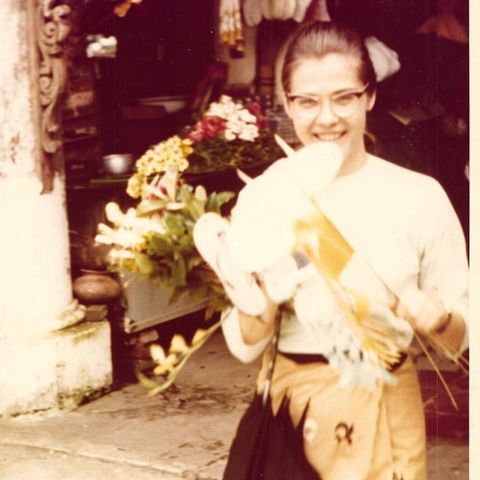Friedgard Lottermoser, Who Made Significant Contributions to the Global Dissemination of Vipassana Meditation, Has Died
An accomplished scholar and author, Lottermoser worked on the books Code of Conduct for Buddhist Nuns and A Critical Pali Dictionary. The post Friedgard Lottermoser, Who Made Significant Contributions to the Global Dissemination of Vipassana Meditation, Has Died appeared...

An accomplished scholar and author, Lottermoser worked on the books Code of Conduct for Buddhist Nuns and A Critical Pali Dictionary.
By Joah McGee Aug 23, 2024 A young Friedgard at Shwedagon Pagoda in Yangon, Burma.
A young Friedgard at Shwedagon Pagoda in Yangon, Burma.Friedgard Lottermoser passed away on August 8, 2024, in Germany, from an aggressive cancer. Dedicating herself to a life that fused Western and Eastern spiritual traditions, Friedgard’s journey was marked by personal transformation and significant contributions to the global dissemination of Vipassana meditation. Under the guidance of Sayagyi U Ba Khin, one of Burma’s most revered meditation masters, she became a testament to the power of mindfulness.
Friedgard was born in Germany in 1942, and grew up during a time of immense upheaval and reconstruction. Her early life was shaped by the challenges of living in a society just emerging from years of brutal dictatorship and the ravages of World War II. Despite the hardships, those formative years instilled in Friedgard a resilience and adaptability that characterized her life.
At some point after the war, her mother remarried. Her stepfather secured a position with Fritz Werner, a German company involved in establishing armament factories in Burma, and in 1959, when Friedgard was just 17, her family relocated there. It was a move that would forever alter the trajectory of her life. It was the beginning of Friedgard’s deep connection with the culture and its people, and a country that became her spiritual home.
The family’s initial years in Burma were spent in Rangoon (now Yangon), where they lived in an exotic but somewhat isolated Chinese-style palace situated on a peninsula in Inya Lake. Surrounded by the lush, colorful, overgrown wilderness, Friedgard developed a sense of curiosity and wonder about the country, which pointed her in the direction of its rich cultural and spiritual traditions.
Fascinated by the Burmese way of life, Friedgard began learning the language and gradually became involved in Burmese society, eventually taking the Burmese name Daw Onmar Khin. Her budding interest in Buddhism led her to the International Meditation Centre (IMC) in Rangoon, where she met Sayagyi U Ba Khin, a pioneering teacher of Vipassana meditation and a good friend of her stepfather who had organized his previous visit to Germany. This turned out to be a pivotal moment in Friedgard’s life. Under the guidance of this great meditation master, Friedgard immersed herself in the practice, becoming a committed disciple at U Ba Khin’s International Meditation Centre for over a decade. She was strongly attracted to the simple yet profound way that Sayagyi presented the teachings.
Friedgard also spent considerable time with both Webu Sayadaw and Maha Gandayone Sayadaw during her time in Burma. Webu Sayadaw, a reputed arhat, was known for his emphasis on the continuous practice of mindfulness, a teaching that profoundly influenced Friedgard’s own meditation journey. Additionally, she was granted rare permission to attend the Maha Gandayone Monastery in Amarapura to study Buddhist philosophy under the guidance of Maha Gandayone Sayadaw, who was renowned for his strict adherence to monastic discipline and deep commitment to monastic education.
While continuing her committed engagement with her spiritual practice, Friedgard also pursued academic studies as one of the few foreign students at the University of Rangoon, and then the University of Mandalay, where she got a master’s degree in Pali; her 1969 thesis was titled The Doctrine of Relationship. Yet her academic pursuits were not just about getting a degree; they also provided her with a deeper understanding of the cultural and historical context in which she was living. This knowledge enriched her spiritual practice, allowing her to connect more deeply with the teachings of the Buddha and the Vipassana tradition. Her ability to integrate into Burmese culture, combined with her commitment to Vipassana meditation, set her apart, and the intersection of her academic and spiritual pursuits laid the groundwork for her future contributions to the global mindfulness movement.
But her time at the university coincided with significant upheaval in Burma. The military coup of 1962, led by General Ne Win, marked the beginning of decades of military rule in Burma. In this period of great political instability, many foreigners were forced to leave the country … but even as her family packed up to return to Germany, she adamantly insisted that she would stay behind to continue her meditation practice and studies. Fortunately, she had a rare kind of scholarship that allowed her to do so.
Nearly a decade later, in 1971, Friedgard left Burma on her own terms to return to Germany to complete a PhD, also in Pali. During the early 1970s, Friedgard supported the emerging globalization of the meditation lineage of Sayagyi U Ba Khin, helping it to gain a foothold in Europe. She facilitated meditation courses for Robert Hover, Ruth Denison, and John Coleman while also corresponding with S. N. Goenka and others.
In her later years, Friedgard’s commitment to Buddhism deepened, leading her to become a bhikkhuni when she ordained as a Samaṇeri, taking the Paḷi name of Akiñcanā. Her ordination marked a significant step in her spiritual journey, reflecting her lifelong dedication to the dhamma. In her view, the disappearance of the bhikkhuni order in Burma and elsewhere was not only a loss for women but a significant historical oversight as well. She believed that there is a strong potential for the revival of the bhikkhuni order, and she actively advocated for this, understanding it as a necessary step for gender equality within the Buddhist community. Friedgard’s perspective on this was based not in contemporary thinking or recent social movements but, rather, was grounded in her historical understanding of the practical and egalitarian spirit of early Buddhism. She contrasted this with later developments that became increasingly patriarchal and restrictive. Friedgard argued that early Buddhism, as practiced by the Buddha, did not impose gender-based limitations on spiritual practice and leadership, suggesting that a return to those principles could lead to greater gender equality within contemporary Buddhist communities.
Friedgard expressed sorrow and frustration over the 2021 coup in Myanmar. She felt a profound sense of loss and disillusionment about the violence and suffering caused by the military’s actions and lamented the senseless brutality inflicted on civilians. Yet her reflections on the coup were grounded in her Buddhist outlook. She saw the military’s acts as not just political tragedies but also as spiritual failings, which, in her view, would lead to severe karmic consequences for those responsible.
Despite her deep resonance with the sufferings of the Burmese people, she was at the same time hopeful that the fall of the military would pave the way for the restoration of peace, justice, and dignity. She hoped for a future where the Burmese people would be able to overcome the divisions and traumas inflicted by the military regime, working together to create a compassionate and harmonious society. She was also a fervent advocate of the current revolution, insisting that now was the time for Burmese to do everything in their power to finally achieve their freedom from decades of oppression and tyranny.
An accomplished scholar and author, Friedgard contributed to the books Code of Conduct for Buddhist Nuns and A Critical Pali Dictionary, and her unpublished thesis was titled Quoted Verse Passages in the Works of Buddhaghosa.
If a Hollywood screenwriter were to fashion a script based on the real-life biography of Friedgard Lottermoser, it would likely be rejected as too fanciful. Her life was truly unique, intersecting so many diverse elements: the modern origins and early global spread of Vipassana meditation; the ongoing battle for freedom to win over tyranny and oppression; and the recognition of women’s rights in all sectors. Her story is a testament to the extraordinary impact one determined individual can have on the world, defying the boundaries of history, culture, gender, and spirituality.
![]()
Thank you for subscribing to Tricycle! As a nonprofit, we depend on readers like you to keep Buddhist teachings and practices widely available.
This article is only for Subscribers!
Subscribe now to read this article and get immediate access to everything else.
Already a subscriber? Log in.

 AbJimroe
AbJimroe 
































